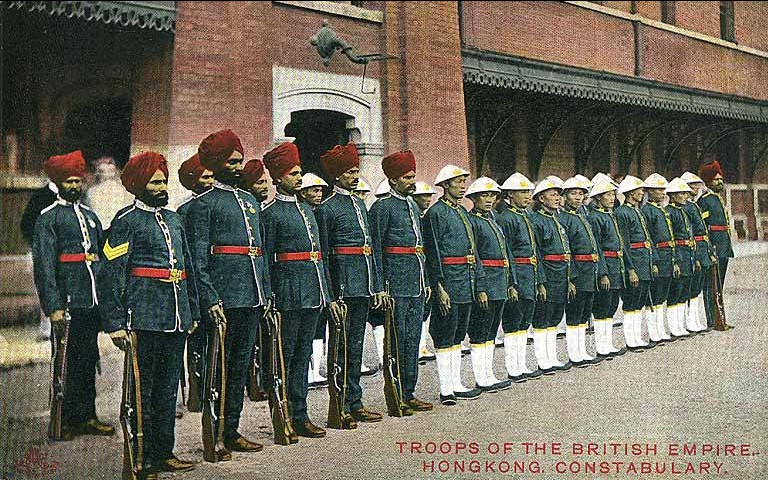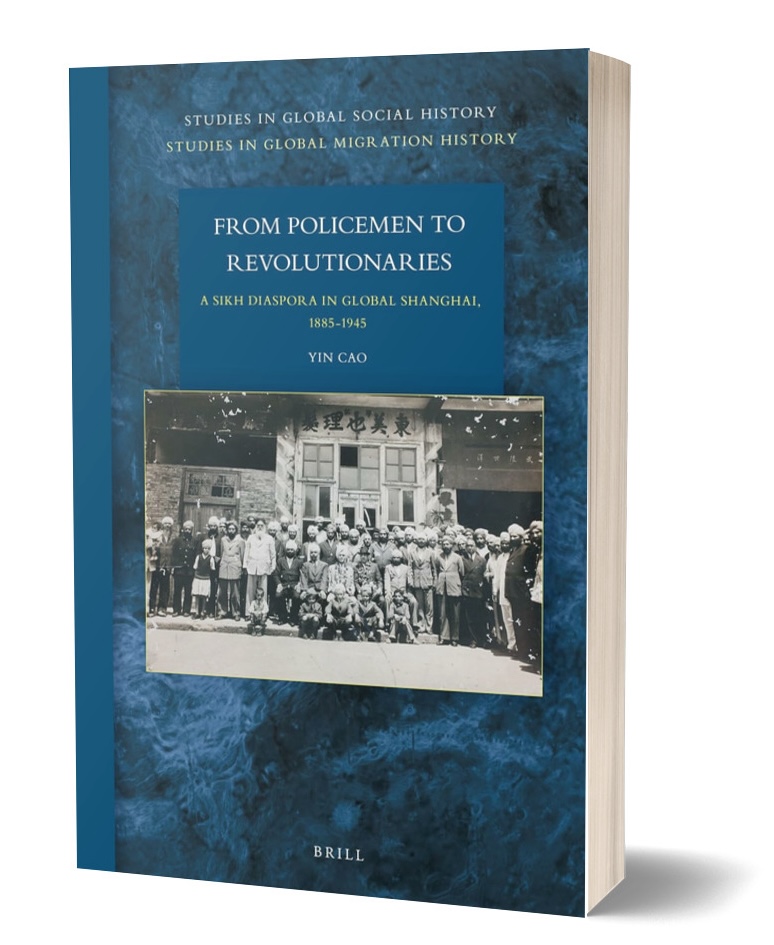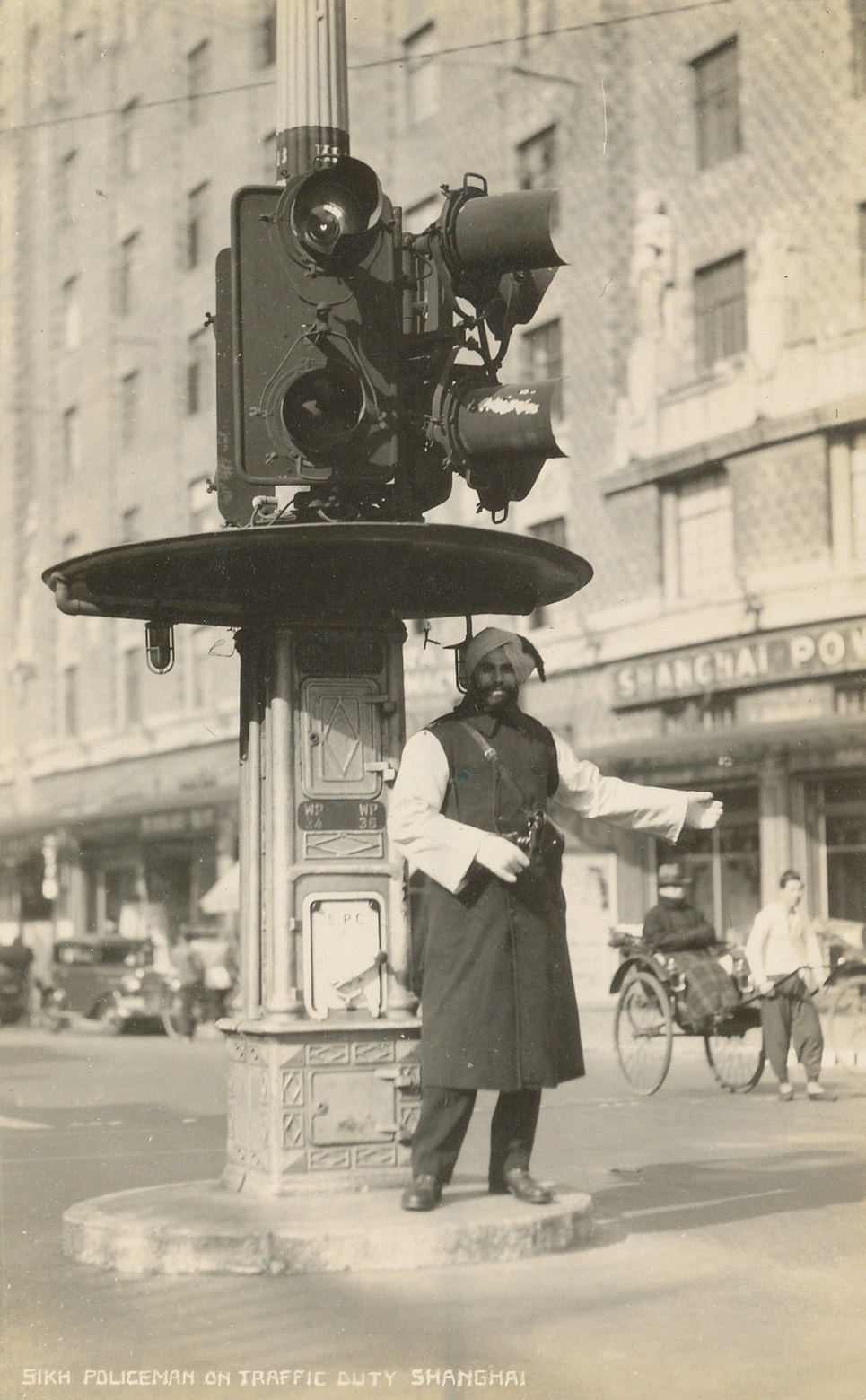From Policemen to Revolutionaries: A Sikh Diaspora in Global Shanghai, 1885–1945 by Cao Yin
Summary and takeaways from the book.
Keywords:
Informed
Feb 16, 2024

Sikhs as part of Hong Kong Police during time of British Empire.
Note that only Sikhs were trusted to carry guns(carbines).
Local policemen were not trusted with guns or had hidden pistols.
Sikhs also rose to position of Sergeant in police of British Hong Kong.
This book is story of Sikh migrants in Shanghai, Hong Kong and Singapore in 1860-1945.
The Sikh migrants served in the British Colonial Police Force of that time.
It is also an insight into the character of the Sikhs.

ISBN: 978-9004344082
Published: November 9, 2017
Pages: 226
Available on:
amazon
Cao Yin received his PhD in History from the National University of Singapore. His research interests cover modern India, global history, and India-China relations in the twentieth century.
Cao Yin is associate professor and Cyrus Tang Scholar in the Department of History, Tsinghua University, Beijing, China.
Tsinghua University is a prestigious university in China and part of the C9 league of premier Chinese Universities(similar to Ivy League in USA). Tsinghua university is comparable to Harvard in its prestige.
Chinese President Xi also studied at Tsinghua University.
Character of the Sikhs
The author indirectly talks about the character of the Sikhs.
The book explains how the idea "
trusting Punjab Sikhs to be good and loyal soldiers and policemen was produced".
"
they were not merely responsible for checking riots and crimes, but also for carrying out the civilizing project in the International Settlement; on the other, they frequently challenged the authorities that they thought to be oppressive and discriminative".
Sikhs were not merely 'Yes-men' or hired policemen or soldiers or mercenaries. They were an equal partner in 'civilizing projects' and a check on oppression and discrimination by the authorities.
Sikh migration
The author starts the book with his account of Sikh migration to part of the British Empire before 1945.
"
Recent studies, however, contend that the patterns, quantities, and organizations of the Asian migration were fundamentally similar to that of the trans-atlantic migration".
Sikhs and other Asians migrated for the same reason that Europeans migrated.
"
Like other Indian and Chinese migrants, Sikhs went overseas to look for better salaries. Economic concern was the primary cause for most migrations at that time".
"
The British Empire not only facilitated the movement of Sikh migrants through providing easy transportations and working opportunities, but also relied on the work of Sikhs to maintain its colonial rule".
British Empire needed Sikhs as much as Sikhs needed economic opportunities offered by the British Empire. There were no favors either way. It was a mutually beneficial relationship.
"
What made Sikh migration special was that many of them actually served in the colonial police forces while their Indian and Chinese counterparts were indentured laborers, miners, craftsmen, and merchants and so became the subjects being policed. In this sense, the Sikh migrants were both colonized subjects on the one hand and executers of the colonial law-enforcement regimes on the other".
The author lists exceptions as well: few hundred Sikhs working in sugarcane plantations in Fiji, and few hundred Sikhs working on Uganda railways. These were exceptions. In most cases, Sikhs were not brought as laborers but to join the colonial police force and army.
Why Sikh policemen in Hong Kong, Shanghai, and Singapore?
 Sikh Policemen in Shanghai in 1935.
Sikh Policemen in Shanghai in 1935.
British colonies of Hong Kong, Shanghai, and Singapore initially were policed by European colonial policemen only. However there was not enough of them in number to police all over the colonies.
"
As the influx of Chinese refugees surged in the late 1850s and early 1860s, residential areas were extraordinarily expanded and thus put great pressure on the already exhausted municipal police.
It was under these conditions that growing numbers of Europeans were added to the unit. Nevertheless, considering the relatively high cost of recruiting policemen from Hong Kong, most newly recruited Europeans were dismissed sailors.
Obviously, neither were they qualified for nor did they really intend to be serious about policing work. Disciplinary cases involving being heavily drunk, absence from duty, and be engage in corruption were widely reported. Even the Superintendent of Police himself, Samuel Clifton, was dismissed in 1860 for corruption".
British colonial forces started hiring locals in the police, but they were poorly paid.
"
In the 1879 Straits[Singapore] Settlements Police Commission Report, colonial officers noted that local policemen’s salaries were too low to support their basic living ($6 a month, even lower than that of common laborers) and that this poor payment pushed the policemen to take bribes".
"
Since most Chinese constables were recruited from amongst local vagrants if not gang members, they made good use of their connections to extort money from Chinese residents and abuse their newly obtained positions to bully their countrymen".
"
Another problem brought about by the introduction of Chinese policemen was that the Chinese yamen (local government) was able to infiltrate into the smp[Shanghai Police] through its influence over the smp’s Chinese staff. Whenever the instruction of the Superintendent was in conflict with the yamen’s, most Chinese constables took the side of the latter in order to avoid being blacklisted by the Chinese authorities".
"
The solution was to adopt a let-aliens-rule strategy—recruiting colonial subjects from one colony and deploying them to other colonies to police the people with whom they were unfamiliar".
Not all colonial subjects were consider suitable. Only 'martial races' - Sikhs and Gurkhas - were considered suitable.
"
From 1867 to 1868, two hundred Sikhs were recruited by Creagh from the Punjab" as part of this strategy.
Transformation
"
In the 1860s the governor of Hong Kong, Sir Richard MacDonnell, castigated the Hong Kong Police as the most corrupt and low-efficiency police force he had known throughout his entire career".
"
From 1867 to 1868, two hundred Sikhs were recruited by Creagh from the Punjab".
"
In the 1870s, the Hong Kong government was remarkably satisfied with their service.
When addressing the Police Force in 1878, the Hong Kong governor Pope Hennessy asserted that the Hong Kong Police was one of the best in the empire and that the Sikh corps was a credit to the colony".
"
It was reported that their clean, modest, and well-disciplined characteristics made them very qualified policemen who were able to conduct almost all police duties".
Not all was perfect.
Tensions with locals
"
Sikh policemen such as Isser Singh were actively involved in population disciplining, riot control, and social order duties".
'Population disciplining' and 'social order duties' are never pleasant tasks, specially when the policeman is a foreigner working for a colonial force, and doesn't speak the language well.
This brought them into conflict with locals. They were hated, challenged and confronted as policemen.
"
their rude attitude toward the Chinese residents while performing duties stirred up strong animosity.
This feeling was furthered by the Chinese racism. In an article published in Shanghai in 1930, the Chinese author wrote:
"For the red-turbaned Sikhs, I always hold a feeling of disgust, with no reason. Their huge bodies, silly heads, and curly beards left people a long-standing nasty impression".
"This racist discourse was widely seen in Shanghai at that time".
"Red-turbaned Sikhs had lost their nation and been enslaved long ago. They were now working for the British in Shanghai and Hong Kong to police the Chinese. They were the most shameless people in the world".
On the other hand, "
even if the Chinese disdained Sikh policemen, their highly disciplined and efficient work impressed the Chinese nationalists and influenced the organization of the Public Security Bureau, the police force of the Special Municipality of Shanghai".
Why Sikhs migrated
Author explains why and how changing social and economic conditions in Punjab led to poverty.
The defeat of Sikhs by British in second Anglo-Sikh war of 1948 turned professional military men and bureaucrats of the Sikh Empire into landless peasants.
"
the British authorities in the Punjab taxed Sikhs not in kind as the Sikh Kingdom used to, but in cash, so that a sharp fall in crop prices led to the bankruptcy of many peasants who failed to sell their products in the markets at a good price".
Large and expensive weddings led to indebtedness.
Land was divided among all male children which made land holdings smaller with each generation.
Large-scale building of roads and railways brought capital and trade. Sikhs were marginalized.
Most Sikhs farmers did not earn much.
Work in Singapore, Hong Kong, and Shanghai police paid Rs.272/year, Rs.377/year, and Rs.525/year. Much more than the British Indian Army which paid Rs 84/year, or working the land.
"
most Sikh policemen in Shanghai remitted a large portion of their earnings back to the Punjab, given their peasantry background. This argument is strongly supported by the case of Constable Sorlan Singh. When he was fined for ten Mexican dollars for drunkenness and misconduct, he had no money to pay the fine, because he had just sent most of his wages back to his wife in India. As a result, he was sentenced to prison for one month".
Sikhs NOT an underclass
Subaltern: a class of people (but especially peasants and workers) subject to the hegemony of another more powerful class. It "
refers to subordination in terms of class, caste, gender, race, languages, and culture".
"
In view of their relations with the British, their economic conditions, and their social status, it is reasonable to categorize these Sikhs as subalterns".
"
while scholars are rushing to explore global connections, localities and the people living there, subalterns in particular, have been left behind".
"In current global history studies, subalterns are often viewed as people who lacked of the resources to move around, and could only stay in localities to wait for some outside forces to connect, influence, and transform them.
This study, however, shows that localities can be transcended and subalterns can be active. Taking advantage of telecommunication and transportation facilities across the British Empire, Sikhs made their own decisions and chose the destinations of their emigration by the turn of the twentieth century".
"
To attract Sikhs to serve in their police forces, authorities in Singapore, Hong Kong, and Shanghai competed with one another and frequently adjusted their recruitment policies over time".
"
In these colonies and settlements, some Sikhs, such as Buddha Singh, chose to collaborate with the British and became a part of the oppressive colonial machine, while others had gradually developed a feeling of discontent with the British rule, owing to the inferior treatment they received".
"Through travelling from the Punjab to Shanghai, Sikh peasants who were exploited by Hindu landlords and British authorities became policemen who were responsible for disciplining the urban population.
Through travelling from Shanghai to Vancouver or San Francesco, law-enforcement agents who were the backbone of British superiority in China became vulnerable migrants who were bitterly discriminated against by the local white people. When some of them returned to Shanghai in the 1910s and 1920s, they became revolutionaries who struggled to destroy British hegemony across the globe".
"
this research demonstrates that the identities of subalterns were multifaceted. Subalterns were neither dominated nor independent of the elites; they might have been revolutionaries, collaborators, or ordinary migrants without any political appeal".
Character of the Sikhs encompassed the full spectrum: revolutionaries, collaborators, traitors, entrepreneurs, elites who ran the system, counter-elites who turned against the system, and common folk.
They were not a passive underclass waiting for salvation from their overlords.
They never acted like a victim with a begging bowl.
They actively pursued opportunities in economic, social and political spheres.
"
As Edward Said points out, once individuals or ideas are on the move, they are exposed to unconscious influence, creative borrowing, or wholesale appropriation. Gradually, they would be transformed, bearing some new meanings or features that are different from those at the point of origin.
this study strongly aims to support this historical trend of looking into all that is connected and interrelated in our human past, to uncover a greater meaning in our common histories".
* * *
The underlying character assessment of the Sikhs based on this book is of enterprising people who can transcend national and cultural barriers in search of opportunities.
Sikhs are politically homeless since the end of their Sikh Empire(
Khalsa Raj) in the 1850’s. The professional military men, and the political and bureaucratic classes were rendered unemployed.
Political homelessness, social conditions(small land holdings, big and wasteful weddings), and changing economics(high taxes, influx of capital, urbanization) forced Sikhs to migrate all over the world.
Sikhs are not timid people as evidenced with their interactions with local people in Shanghai, Hong Kong and Singapore.
Sikhs have engaged with other cultures on their own terms and as equals. There were no favors, and no regrets. It was a mutually beneficial relationship.
Sikhs have provided their services with loyalty, and impressed all with "highly disciplined and efficient work". Hong Kong Governor Pope Hennessy inspected the police force in 1878 and
said that "
Sikh corps is a credit to the Colony".
As the book title suggests, they never lost the revolutionary spirit of a 'martial race' they are credited with.
We hope that influential graduates and decision makers like President Xi of China’s Tsinghua University and other C9 League of universities read this for a fair assessment of Sikhs.
Related articles
The New Silk Roads: The New Asia and the Remaking of the World Order by Peter Frankopan
Can Asians Think? Understanding the Divide Between East and West by Prof. Kishore Mahbubani
External Links


